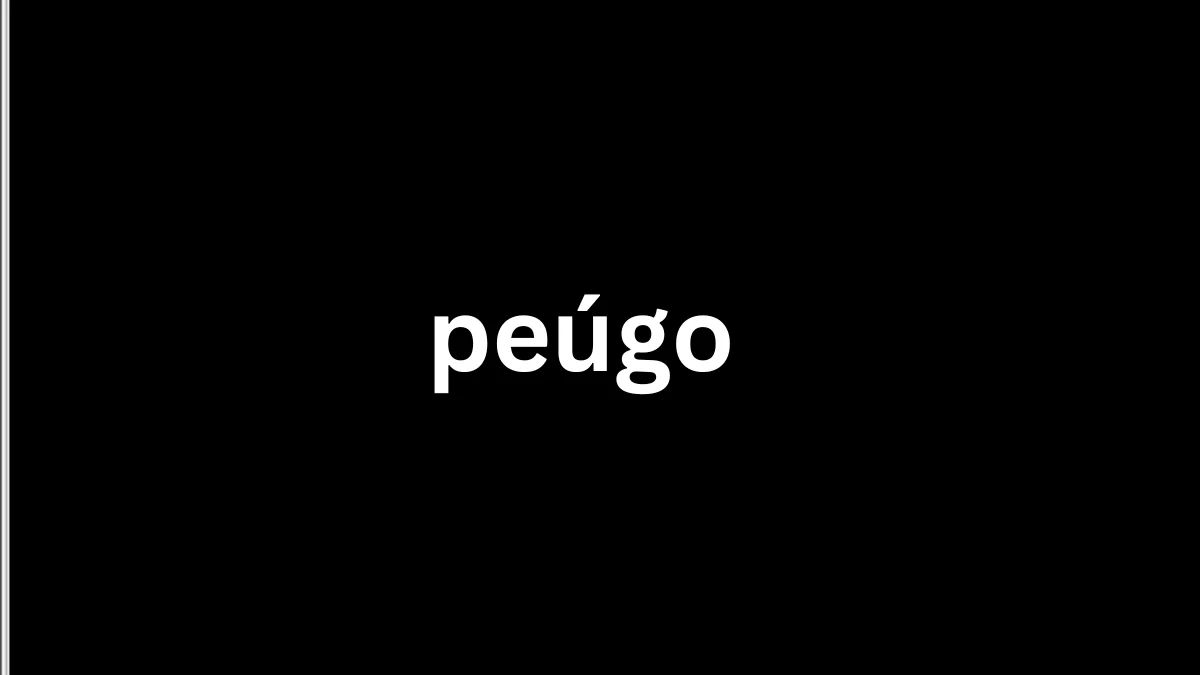General
Peúgo: Unveiling the Two Sides of a Word

The Portuguese language is rich with diverse vocabulary, and sometimes a single word can hold surprising depth. “Peúgo” is one such example. Depending on the context, it can have two distinct meanings, making it a fascinating word to explore. This article delves into the world of peúgo, uncovering its etymological roots, its contrasting definitions, and its usage in everyday Portuguese.
Unveiling the Etymology: Where Does Peúgo Come From?
The exact origin of “peúgo” remains unclear. However, some linguists propose a connection to the word “peúga,” which translates to “sock” in English. This theory suggests that “peúgo” might have originated as a variant or diminutive form of “peúga,” possibly referring to a shorter type of sock.
Another possibility lies in the realm of onomatopoeia. The sound “peúgo” could be a playful representation of someone splashing in water. This theory, however, lacks strong etymological evidence.
Without a definitive origin story, the word “peúgo” holds a certain mystique. Its ambiguity adds a layer of intrigue to the Portuguese language.
Two Sides of the Coin: The Dual Meanings of Peúgo
The true essence of “peúgo” lies in its ability to represent two contrasting concepts:
-
Meia Curta (Short Sock): This is the most common meaning of peúgo in contemporary Portuguese. It refers to a type of sock that reaches just above the ankle, often worn with casual shoes or sneakers.
-
Hidrolátrico (Water-Lover): This lesser-known definition of “peúgo” is an adjective with a more whimsical character. It describes someone who has a deep love for water, someone who enjoys swimming, diving, or simply spending time near water bodies.
The stark contrast between these meanings highlights the beauty and complexity of language. A single word can morph into different forms, catering to various contexts and adding a touch of surprise for the listener.
Understanding Usage: When to Use “Peúgo”
Knowing the two meanings of “peúgo” is only half the battle. Here’s a breakdown of how to use it correctly in different situations:
Using “Peúgo” as a Noun (Meia Curta):
- When discussing clothing: “Preciso de comprar peúgos novos para a academia.” (I need to buy new peúgos for the gym.)
- Describing someone’s attire: “Ele estava usando jeans e peúgos brancos.” (He was wearing jeans and white peúgos.)
Using Peúgo as an Adjective (Hidrolátrico):
- Highlighting someone’s love for water: “Minha irmã é tão peúga, ela adora nadar no mar.” (My sister is such a peúgo, she loves swimming in the ocean.)
- Describing a group of water enthusiasts: “O clube reúne um grupo de peúgos que gostam de mergulho.” (The club brings together a group of peúgos who enjoy diving.)
Points to Remember:
- While “peúgo” (sock) is the more common meaning, using it as “hidrolátrico” adds a touch of creativity and playfulness to your conversation.
- The adjective form “peúgo” is less frequently used compared to the noun form.
Exploring the Nuances: Formal vs. Informal Settings
The context in which you use peúgo also plays a role. Here’s a quick guide:
-
Formal Settings: In formal situations, it’s best to stick with the more standard vocabulary. Opt for “meia curta” (short sock) instead of “peúgo” (sock). Similarly, “amante da água” (water lover) would be a safer choice than “hidrolátrico” (water-lover) in formal contexts.
-
Informal Settings: Among friends and family, feel free to use “peúgo” in both its noun and adjective forms. It can add a touch of informality and lightheartedness to your conversation.
Remember: Context is key. Choose the meaning and form of “peúgo” that best suits the situation and the level of formality you’re aiming for.
Fun with “Peúgo”: Examples and Idioms (if any)
There aren’t any specific idioms directly related to “peúgo.” However, you can use the word creatively in sentences to add a touch of humor:
- “Ele é tão desorganizado que perdeu um peúgo e nem percebeu!” (He’s so disorganized, he lost a peúgo and didn.
